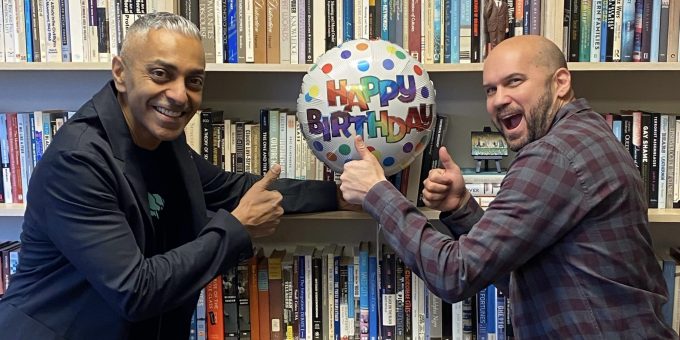
Celebrating our first year as Contexts' editors!
Letter from the Editors: Winter 2024
“Celebrate good times, come on!”
The start of a new year brings opportunities for gratitude. Check us out: here we are, all smiles, celebrating our one-year anniversary as editors of Contexts! Looking ahead to 2024, we anticipate another year of scintillating stories and invigorating new voices—starting with this issue.
These pages are packed with thought-provoking inquiries, but we are especially ecstatic about the chat we had with the inimitable Malcolm Gladwell, the first of many Q&As with global thought leaders that we will present over the year. As a public-facing magazine, Contexts is committed to translating sociological science into easily readable yet still rigorous essays. For many researchers, writing this way might feel mysterious, or even intimidating. Gladwell reveals his process for how to transform dense ideas into rad and relevant narratives that hook the reader right away. If you’ve been wondering how to find or looking to home your public voice, then you’ll find that his advice is directed to you. Gladwell reminds us that the things we find inspiring are “rarely [due] to a lightning strike” but, rather, are pieces of writing that make strategic use of lively storytelling, smart editing, and thoughtful wordsmithing.When we asked how social science inspires his work, Gladwell replied, “If I want to talk about this really complicated, heartbreaking topic, I need it to be grounded in a place that can be described.” Places abound in our first issue of the new year, in fact. Its theme, “Inside Institutions,” refers to one of the most enduring types of places in sociological lore. Institutions channel how we feel, think, and act; they enable or constrain the decisions we make and the outcomes we dream possible. As you flip through these glossy pages, you will see how the U.S. military’s vague promise of fast-tracked citizenship incentivizes service among migrants without always delivering on its end of the deal, how LGBTQ+ people are changing their faith communities, and how school choice policies are exacerbating segregation.
Peopling places is a theme that expresses across the entire issue. A particularly powerful pair of essays highlight the struggles of the unhoused. David Bacon’s evocative photo essay takes us to Wood Street, an encampment in the process of demolition at the hands of local government; the housing developments that will take its place are, predictably, well out of reach of those who will soon be evicted. This visual story is complimented by a culture essay, where we gain the personal perspectives of folks begging for change, and humanity, on Atlantic City’s famed boardwalk.
Gladwell also pushes the aspiring public intellectual to write “simply and clearly,” as though you are “having a conversation… at a party,” a theme picked up by Michael Kennedy in his anchoring One Thing I Know essay, where he reminds us that the meaning of the word “public” is itself manifold. In that spirit, another feature elevates the voices of Black women who struggle with their presentation of self in institutions where they fear that the unique biological properties of their skin will make them appear too young for the roles they have earned. Qualitative research lends itself to masterful storytelling, and this essay exemplifies its strengths. But so, too, can quantitative work produce captivating narratives, as we see in the trends section, where our authors use statistics in service of offering digestible discussions about the parallels between COVID-19 deaths and the flu, in one essay, and how, in another, perceptions about crime and drug addiction change over time and across groups of people.
From our editorial offices in Vancouver to your desk or living room, we hope you’ve enjoyed our first year. Kool & the Gang was wise to encourage us to celebrate good times. “There’s a party goin’ on right here,” like they said—in these pages, in fact, going strong still, and you’re invited! Better yet, there are gifts: from the quick-read In Briefs about some of the best research being published in sociology today to our gorgeous features, from stunning photos to thoughtful book reviews, we hope you savor all this great writing.
Seth Abrutyn & Amin Ghaziani
